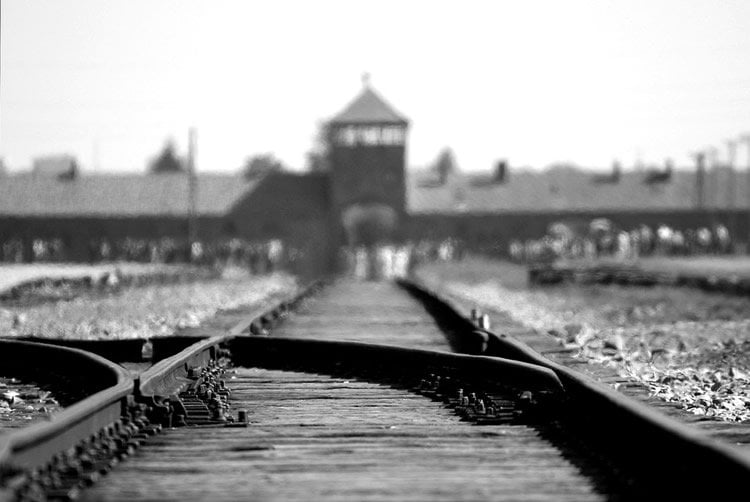Summary: Researchers report the offspring of mothers who were Holocaust victims as young children, were 1.7 times more likely to have a more severe course of Schizophrenia.
Source: University of Haifa.
Results of a new study at the University of Haifa have found that no difference in the risk of developing schizophrenia between second-generations Holocaust survivors and those whose parents were not exposed to the Holocaust. However, an examination of various sub-groups showed that second-generation survivors whose parents were babies during the Holocaust are at higher risk of suffering from a more severe course of schizophrenia. “Likely these are transmitted from the parental environment to the child” commented Prof. Stephen Levine, the lead author of the study.
The study was undertaken by Prof. Stephen Levine and Prof. Itzhak Levav of the Department of Community Mental Health at the University of Haifa, together with Ms. Inna Pugachova, Ms. Rinat Yoffe, and Ms. Yifat Becher of the Ministry of Health. The study was based on information on 51,233 individuals who immigrated to Israel through 1966, and was made possible thanks to the cooperation with the Ministry of the Interior and the Ministry of Health, with funds from Israel Science Foundation and published in Schizophrenia Research. The research population included individuals who experienced the Holocaust directly, while the comparison group comprised of individuals who immigrated to Israel before the Holocaust began in their respective country of origin. All the second-generation subjects were born between 1948 and 1989, and were followed through 2014 to ascertain whether or not they suffered from schizophrenia.
The question of the impact of exposure to the Holocaust among second-generation survivors is the subject of disagreement among researchers. Clinic-based studies have found that trauma increases psychopathology in the offspring of Holocaust survivors, while community based studies have found that there is no such effect among adult s, as noted by Levav and collaborators in two large representative samples in Israel
The researchers sought to examine whether parental Holocaust exposure is associated with schizophrenia among second-generation survivors. The good news is that the association was not significant.

However, a more specific inquiry showed that offspring to mothers with Holocaust exposures in the womb only were 1.7 times more likely to have a more severe course of the disorder. Similarly, offspring to mothers exposed to the Holocaust in the in the womb and thereafter were 1.5 more likely to have a more severe course than persons not exposed. Among offspring to fathers exposed in the womb and thereafter were 1.5 times, and those whose fathers exposed at ages 1–2 had offspring with similar risk to have a worse course of the disorder than persons not exposed.
Transgenerational genocide exposure was unrelated to the risk of schizophrenia in the offspring, but was related to a course of deterioration in schizophrenia during selected parental critical periods of early life. This implies an epigenetic mechanism – namely arising from environmental influences on the way genes expressed themselves. The findings inform health policy decision makers about refugees who suffered from extreme adversity, and extend existing results regarding the transgenerational transfer of the effects of famine and stress in parental early life.
Funding: The study was funded by Israel Science Foundation.
Source: Ela Kehat – University of Haifa
Image Source: This NeuroscienceNews.com image is adapted from the University of Haifa press release.
Original Research: Abstract for “Transgenerational effects of genocide exposure on the risk and course of schizophrenia: A population-based study” by Stephen Z. Levine, Itzhak Levav, Inna Pugachova, Rinat Yoffe, and Yifat Becher in Schizophrenia Research. Published online July 9 2016 doi:10.1016/j.schres.2016.06.019
[cbtabs][cbtab title=”MLA”]University of Haifa. “Second Generation Holocaust Survivors Suffer More Severe Course of Schizophrenia.” NeuroscienceNews. NeuroscienceNews, 16 September 2016.
<https://neurosciencenews.com/holocaust-schizophrenia-psychology-5060/>.[/cbtab][cbtab title=”APA”]University of Haifa. (2016, September 16). Second Generation Holocaust Survivors Suffer More Severe Course of Schizophrenia. NeuroscienceNews. Retrieved September 16, 2016 from https://neurosciencenews.com/holocaust-schizophrenia-psychology-5060/[/cbtab][cbtab title=”Chicago”]University of Haifa. “Second Generation Holocaust Survivors Suffer More Severe Course of Schizophrenia.” https://neurosciencenews.com/holocaust-schizophrenia-psychology-5060/ (accessed September 16, 2016).[/cbtab][/cbtabs]
Abstract
Transgenerational effects of genocide exposure on the risk and course of schizophrenia: A population-based study
Background
Hypotheses about the sequel of parental genocide exposures on the offspring’s risk and course of schizophrenia remain untested.
Aims
To test hypotheses related to the transgenerational transmission of parental genocide exposure on the risk and course of schizophrenia.
Methods
Data were extracted from the National Population Register on all offspring (N = 51.233; born: 1948–1989) whose parents were born (1922 to 1945) in Nazi- dominated European nations. Both parents either immigrated before (indirect exposure: n = 1627, 3.2%) or after (direct exposure: n = 49.606, 96.8%) the Nazi era. Offspring subgroups were identified from the initial timing of parental exposure (e.g., likely in utero, combined in utero and postnatal, or postnatal). Schizophrenia disorders were ascertained (1950–2014) from the National Psychiatric Case Registry. Cox models were computed to compare the offspring groups with respect to the risk and the adverse course of schizophrenia, adjusting for confounders.
Results
The offspring rates on the risk and course of schizophrenia did not differ by parental affiliation to the direct and indirect exposure groups. Cox models showed that offspring subgroups with maternal Holocaust exposures in utero only (HR = 1.74, 1.13, 2.66) and combined in utero and postnatal (HR = 1.48, 1.05, 2.10); as well as paternal Holocaust exposures combined in utero and postnatal (HR = 1.48, 1.08, 2.05), and early postnatal (aged 1–2; HR = 1.49, 1.10, 2.00) had a significantly (P < 0.05) higher psychiatric re-hospitalization rate than the indirect group.
Conclusions
Transgenerational genocide exposure was unrelated to the risk of schizophrenia in the offspring, but was related to a course of deterioration during selected critical periods of early life.
“Transgenerational effects of genocide exposure on the risk and course of schizophrenia: A population-based study” by Stephen Z. Levine, Itzhak Levav, Inna Pugachova, Rinat Yoffe, and Yifat Becher in Schizophrenia Research. Published online July 9 2016 doi:10.1016/j.schres.2016.06.019






